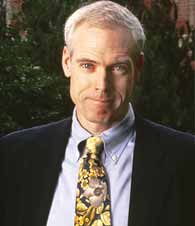|
Executive Interviews: Interview with Jim Collins on Level 5 Leadership
January 2008
 Jim Collins
Jim Collins Founder of Management Laboratory in Boulder, Colorado, 
And what did you find?
Working on the monograph taught me
that there are significant differences
between the business and social
sectors. For instance, in business,
money is both an input (a resource for
achieving greatness) and an output (a
measure of greatness); in the social
sectors, money is only an input, and
not a measure of greatness. We also
recognized the distinction between
executive leadership (found more in
business) and legislative leadership
(found more in the social sectors). In
business, a single individual often has
enough concentrated power to simply
make executive decisions; in the social sectors,
|
|
composed of a much
more complicated governance and
power structure, rarely do we find a
single individual not even the
nominal chief executive with
enough concentrated power to make
the big decisions by himself or herself.
There are a number of additional
observations that came clear to us
when setting the social sectors in
contrast to the business sector, yet one
overarching point stands out: the
primary path to greatness for the
social sectors is not to become more
like a business; the critical difference
INTERVIEW 6
is not business versus social, but great
versus good. What ideas from your research have
been most helpful to you as an
individual?
I ve been particularly influenced by the
First Who principle. I used to believe
that the critical questions in life were
about what what decisions to
make, what goals to pursue, what
answers to give, what mountains to
climb. I ve come to see that the most
important decisions are not about
what, but about who. The primary
question is not what mountains to
climb, but who should be your
climbing partner. If you want to have a
great life, the most important question
is not what you spend your time doing,
but who you spend your time with.
First who, then what life is people. What ideas from your research have
most appealed to other people at a
personal level?
Two ideas: People have found very
helpful the idea of a personal
hedgehog concept: what you are
passionate about, what you are
genetically encoded for, what you
can make a living at. If you find the
intersection of these three circles,
you have a personal hedgehog for
life. Second is the idea of the
Stockdale Paradox for dealing with
difficult times: you must retain
absolute unwavering faith that you
can and will prevail in the end and at
the same time confront the most
brutal facts of your current reality.
Many people have told me that the
Stockdale Paradox helped them
through difficult times. What are the most important
lessons you ve learned from your
passion for rock climbing that have
influenced your way of thinking about
building great companies?
I ve learned so much from rock
climbing. I ve learned the importance
of picking the right partner. I ve
learned the importance of assessing
risk. I ve learned the importance of
always learning, always being a
beginner. But perhaps the most
important lesson for business is to not
confuse luck with competence. I had a
professor in graduate school named
Robert Burgelman who pounded into
me the idea that the single most
dangerous perspective in business
and life is not outright failure, but to
be successful without being
absolutely clear about why you were
successful in the first place. Success,
he pointed out, clouds judgment.
Better to operate with brutal selfhonesty
about the role of factors other
than yourself. As I look at the best
executives from my research, they
used this idea not as a form of
weakness, but as a form of selfdiscipline
perhaps we were just
lucky, so we d better be just that much
more disciplined to make ourselves
just that much stronger, so that we will
still be strong if our luck ever runs out
. This is exactly the type of
productive neurosis you need to
prevail in highly turbulent or
dangerous environments, where
overestimating your capabilities can
lead to disastrous outcomes. What has been the most
important decision in your own
career?
The decision to become a selfemployed
professor. I loved teaching
entrepreneurship and small business
at Stanford Graduate School of
Business in the early 1990s, but I
found that I did not fit entirely into the
mold of a traditional academic, and I
did not want to go down the
traditional academic path. With the
guidance of great mentors who helped
me think through my options, I came
to see that I could choose to invert the
phrase professor of
entrepreneurship and, instead,
become an entrepreneurial professor.
Thats when I moved back to Boulder,
Colorado, set up a research laboratory
in my old first grade classroom, and
became a self-employed professor. I
explicitly did not set up a consulting
business or a training company.
Rather, I organized my calendar
exactly as I did when on faculty at
Stanford: 50% of my time in research,
writing and idea development; 30% of
my time in various forms of teaching;
20% of my time on administrative and
organizational tasks that just need to
get done. I was lucky that the decision
worked, and I remain passionately
engaged in my intellectual work.
1.
Leadership and Entrepreneurship Case Studies
2. ICMR
Case Collection
3.
Case Study Volumes
|
